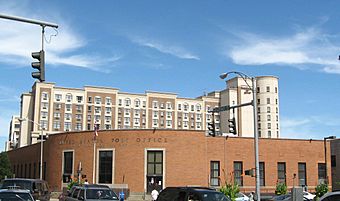United States Post Office (New Rochelle, New York) facts for kids
Quick facts for kids |
|
|
US Post Office-New Rochelle
|
|
 |
|
| Location | 255 North Ave. (corner of North Ave. and Huguenot St.), New Rochelle, New York |
|---|---|
| Built | 1937 |
| Architect | Hart & Shape; Frost, David Hutchinson |
| Architectural style | Moderne |
| MPS | US Post Offices in New York State, 1858-1943, TR |
| NRHP reference No. | 88002368 |
| Added to NRHP | May 11, 1989 |
The main U.S. Post Office in New Rochelle is an important building located at 255 North Avenue in New Rochelle, New York. It sits at the corner of North Avenue and Huguenot Street. This post office handles mail for several areas, including parts of New Rochelle and nearby towns like Pelham and Pelham Manor.
This historic building was added to the National Register of Historic Places in 1989. The National Register is a list of places in the United States that are important for their history, architecture, or culture. The New Rochelle Post Office is one of many post offices in New York State that received special artwork, like murals or sculptures, during the Great Depression. This artwork was part of a government program called the New Deal, which helped artists find work.
The New Rochelle Post Office Building
New Rochelle was first settled by French people called Huguenots in the late 1600s. They bought the land where the city now stands. Over time, New Rochelle grew into a busy suburb where many people lived and traveled to New York City for work. By the time the current post office was built, about 60,000 people lived in the city.
The very first post office in New Rochelle opened in 1799. Before the current building, another federal post office stood on this same spot, built in 1915. That older building was taken down, and the current post office was constructed between 1936 and 1938. This project was part of a bigger government effort to create jobs during the Great Depression, a time when many people were unemployed. The building was designed by local architect Frederick Frost along with Hart & Shape.
The New Rochelle Post Office was a great example of public buildings in New York. It was one of the few post offices built in the Art Moderne style, which is a sleek, modern design. It also had unusual exterior walls made of terra-cotta, a type of baked clay. However, these terra-cotta walls were replaced later, probably in the 1960s. The inside lobby was also changed. But even with these changes, three special murals from 1940 still remain inside.
A Look Inside: The Murals
The New Rochelle Post Office is famous for its beautiful murals. These large paintings were created by the U.S. Treasury Department as part of the public works programs during the Great Depression. The goal was to help artists who were out of work.
The murals were painted by a local artist named David Hutchinson and were put up in the post office in 1940. These paintings are special because they show important historical events from the New Rochelle area. They are also very large and have unique shapes.
There are three main murals:
- "The Huguenots Lay the Foundations of the City of New Rochelle" This large mural shows a scene from the late 1600s. It depicts French Huguenots building their first log cabins in the area.
- "John Pell Receives Partial Payment for 6,000 Acres" This mural illustrates the moment when the Huguenots bought the land for New Rochelle in the 1680s.
- "The Post Rider Brings News of the Battle of Lexington" This painting shows the community getting news about the start of the Revolutionary War. This was a popular topic for post office murals in towns that played a part in the war.
The main mural is about six feet tall and thirty-three-and-a-half feet long. The other two murals are each about seven feet tall and fifteen feet long. These murals help tell the story of New Rochelle's rich history right inside the post office!



